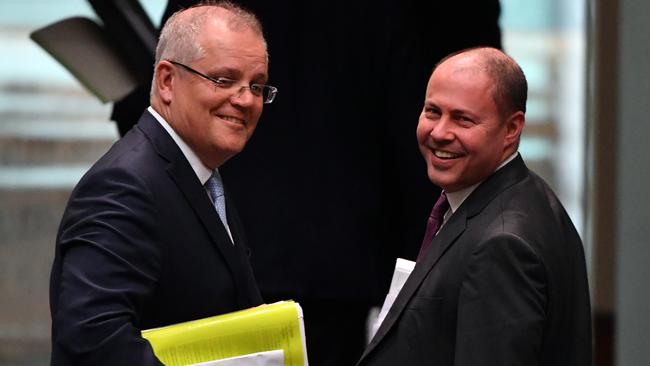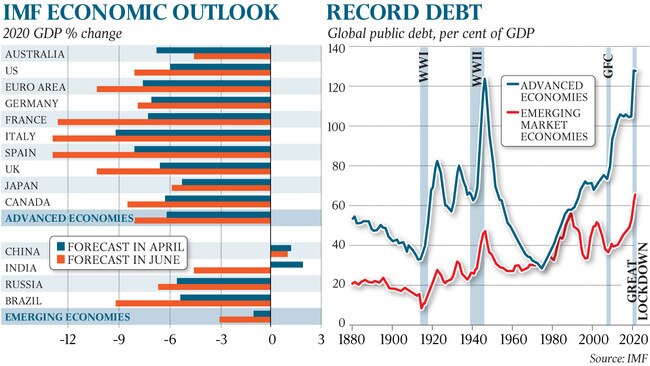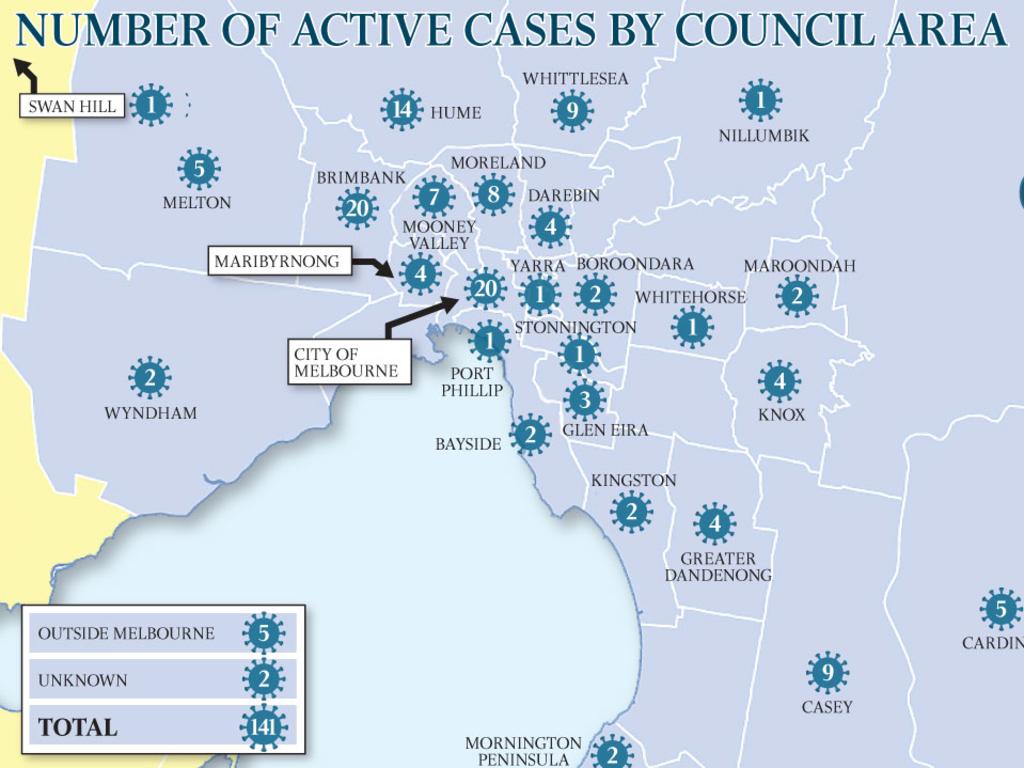Growth hit from coronavirus softer than feared: IMF
The Australian economy is forecast to be one of the world’s best through the virus recession, predicts the International Monetary Fund.

The Australian economy is forecast to be one of the world’s best performers through the coronavirus recession, despite fresh warnings of an even more dire global downturn than previously expected.
The International Monetary Fund in its latest world outlook has revealed the pandemic will lead to a deeper-than-expected 4.9 per cent plunge in global economic activity in 2020 — 1.9 percentage points worse than previously forecast.
Australia — alone among advanced economies — will suffer a milder-than-anticipated GDP contraction of 4.5 per cent this year, down from an April prediction of a 6.7 per cent drop.
Australia was one of “few exceptions” where March quarter growth wasn’t worse than expected, the IMF said, as it downgraded economic prospects across the developed world.
Josh Frydenberg said the fact the IMF had issued more pessimistic forecasts across advanced economies while upgrading Australia’s showed “the Australian economy remains remarkably resilient in the face of the coronavirus crisis”.
“There is still a long way to go in recovering from this health and economic crisis but there are encouraging signs across the economy and we will continue to do all that is necessary to ensure Australia bounces back stronger on the other side,” the Treasurer said.
Mr Frydenberg also pointed to the IMF’s warning of the devastating impact a second COVID-19 outbreak could have on the global economy, with GDP growth 4.9 percentage points lower in 2021 and 3.3 percentage points lower in 2022 should a second outbreak occur.
“This is another powerful reminder that as restrictions are eased, we must remain vigilant, follow the health advice and download the COVIDSafe app,” he said.
IMF chief economist Gita Gopinath said the deeper global downturn this year than predicted in April would be followed by an even more fraught and uncertain rebound.
“This crisis like no other will have a recovery like no other,” Ms Gopinath said.
Other countries that recorded better than expected growth over the first three months of the year, such as Germany, Japan and India, still received downgraded growth forecasts for 2020.

The IMF report comes a day after global ratings agency Moody’s reaffirmed Australia’s AAA credit-rating, saying “the resilience of the Australian economy supports a return to positive growth next year, without any significant long-lasting impact on growth potential once the crisis passes”.
Australia’s relative success in suppressing the spread of the virus has allowed restrictions across most of the country to be eased earlier than expected.
Reserve Bank governor Philip Lowe said this week the hit to economic activity from the health crisis had not been as bad as in other countries, and “not as severe as we had expected”.
Ms Gopinath said there would be a “synchronised deep downturn in 2020” across the world.
Advanced economies are now expected to contract by 8 per cent as a group, rather than the 6.1 per cent forecast in April, while developing nations are expected to suffer a 3 per cent collective hit to GDP, two percentage points worse than previously expected.
The IMF on Wednesday evening issued more pessimistic forecasts for all advanced economies, including France, Italy and Spain, as well as Japan, Britain and Canada.
The US, which has now recorded more than 2.4 million confirmed coronavirus cases — the highest number in the world — will suffer an 8 per cent economic contraction in 2020.
The forecast hit is much more severe than the 5.9 per cent contraction the IMF predicted two months earlier.
A shallower recession in Australia, while still expected to be the worst since the Great Depression, will flow through to a flatter rebound of 4 per cent in 2021, rather than 6.1 per cent, the report said.
Countries that have managed the health crisis well, allowing them to begin reopening their economies, would still face a slower recovery than previously thought, the IMF said.
Social distancing requirements in some form would persist into the second half of 2020, and there would be a “hit to productivity as surviving businesses ramp up necessary workplace safety and hygiene practices”, it said.
Additionally, the larger-than-anticipated hit over the first half of the year as a result of forced lockdowns would result in “greater scarring” of economies, as firms closed and the newly unemployed struggled to re-enter the workforce. This could “make it more difficult for activity to bounce back once the pandemic fades”.
Three-quarters of countries were now reopening their economies, Ms Gopinath said.
“Several countries have started to recover,” she said.
“However, in the absence of a medical solution, the strength of the recovery is highly uncertain and the impact on sectors and countries uneven.”
The improvement in Australia’s outlook comes as Treasury finalises a review of the $70bn JobKeeper program.
The government will release a mini-budget on July 23 that is expected to detail how Australia can avoid a “fiscal cliff” after the September cut-off for major emergency support programs.
In its latest report, the IMF said the removal of targeted support “should proceed gradually to avoid precipitating sudden income losses and bankruptcies just as the economy is beginning to regain its footing”.
Ms Gopinath warned that the COVID-19 crisis would leave a legacy of global government debt that, as a proportion of world GDP, would this year reach “the highest level in recorded history”.
“Countries will need sound fiscal frameworks for medium-term consolidation, through cutting back on wasteful spending, widening the tax base, minimising tax avoidance and greater progressivity in taxation in some countries,” she said.








To join the conversation, please log in. Don't have an account? Register
Join the conversation, you are commenting as Logout